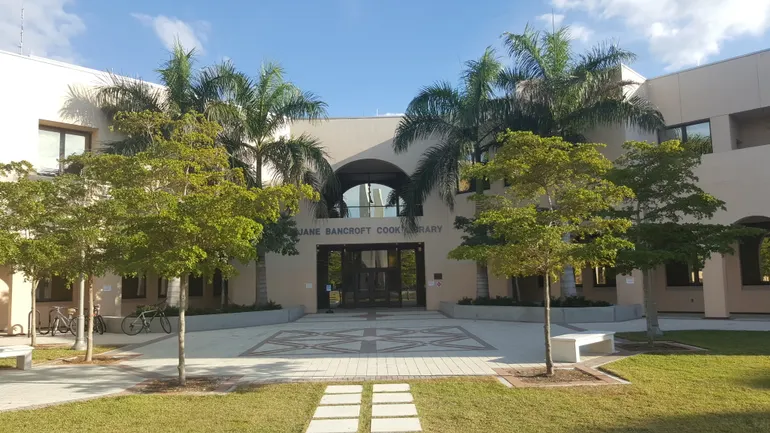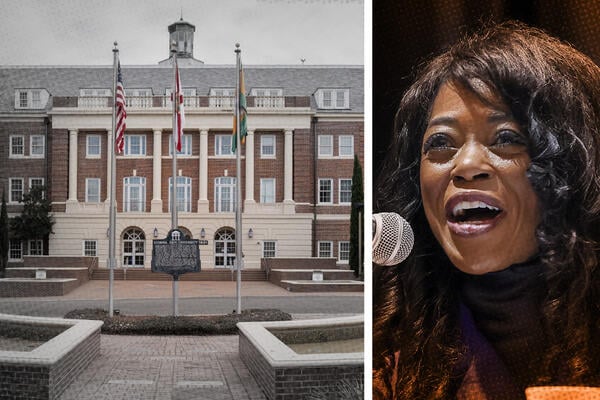Dive Brief:
- The New College of Florida could take control of the University of South Florida’s Sarasota-Manatee campus under a new proposal from Florida Gov. Ron DeSantis.
- Under DeSantis’ 2026-27 state budget, New College would assume control of USF Sarasota-Manatee’s 32-acre property and related liabilities by July. In exchange, the college would pay USF roughly $166,600 per month for debt tied to the property.
- Current USF Sarasota-Manatee students would have a “reasonable opportunity” to finish their degrees at the campus before New College could fully take over the property, according to the proposal. If the proposal takes effect, USF could not enroll new students at its Sarasota-Manatee campus going forward.
Dive Insight:
With DeSantis’ proposal, the liberal arts-focused New College, also based in Sarasota, would undertake a major expansion. However, the governor’s budget proposal essentially represents a legislative wish list, making the ultimate outcome still uncertain.
“This is a policy matter that is going to be discussed, debated and worked through over the coming months of the Legislative Session,” Will Weatherford, chair of USF’s governing board, said at a meeting on Thursday, according to local media. “We don’t control the outcome of that discussion.”
The proposal would not transfer USF’s Sarasota-Manatee students or employees to New College.
USF would retain its intellectual and other intangible property, as well as records and equipment, and have priority over the space while its current students finish their degrees.
However, the budget provision states that the two institutions could forge a “mutual agreement to share or use space in any of the transferred properties or facilities when it is in the best interest of both institutions or their students.”
News of such a plan for New College to take over the campus broke earlier this year.
Emails unearthed in March by WUSF — a public news outlet owned by USF — included a draft press release penned by New College announcing it would integrate the Sarasota-Manatee campus. The draft release trumpeted millions of dollars in potential savings and the elimination of redundancies between the two institutions.
The draft said the “strategic partnership between the next door colleges aims to create a unified, world-class institution that maximizes resources, eliminates redundancies, and elevates opportunities for students, faculty, and the region.”
“New College’s rapid growth will immediately benefit from the additional physical space provided by the USF-SM campus,” the draft release also stated. “The integration also addresses longstanding inefficiencies, consolidating administrative functions and aligning academic offerings.”
In New College’s envisioning, according to the draft, the integration would create “streamlined transfer pathways” for USF Sarasota-Manatee students to the university’s Tampa flagship or St. Petersburg campuses, or New College.
Prior to those discussions of a transfer, New College in 2024 took over a 9-acre waterfront property, originally set aside for USF Sarasota-Manatee, which the college said would grow its student population.
New College has become a lynchpin in DeSantis’ efforts to remake higher education in Florida. In 2023, the governor revamped the college’s board and named his longtime ally Richard Corcoran — former Republican state House speaker and Florida education commissioner — as its president.
In the intervening two years, Corcoran and the board have killed the institution’s once-robust diversity, equity and inclusion efforts and dismantled its gender studies department, among other changes favored by conservatives.
In October, New College became the first to publicly volunteer for President Donald Trump’s higher education compact, which offers colleges priority in research funding in exchange for adopting a slate of policies put forward by the Trump administration.
The legal foundations of the compact have been widely questioned, and most of the nine research universities directly offered the deal rejected it over concerns about free speech, institutional independence and maintaining meritocracy in funding. New College, on the other hand, said it would “happily be the first” to embrace the compact.
“We have no affirmative action or DEI, and we have been building a campus where open dialogue and the marketplace of ideas are at the forefront of everything we do,” Corcoran said at the time.
Meanwhile, USF Sarasota-Manatee has been growing its physical footprint. The campus, long a commuter-only institution, last year opened a new 100,000-square-foot combined residence hall and student center that it billed as the campus’s first student housing and major expansion since opening in 2006.
New College is renting space in USF Sarasota-Manatee’s new facility to house some of its students. That expense, combined with renting nearby hotel rooms for the same purpose, is costing the college millions of dollars each year, according to WUSF.




